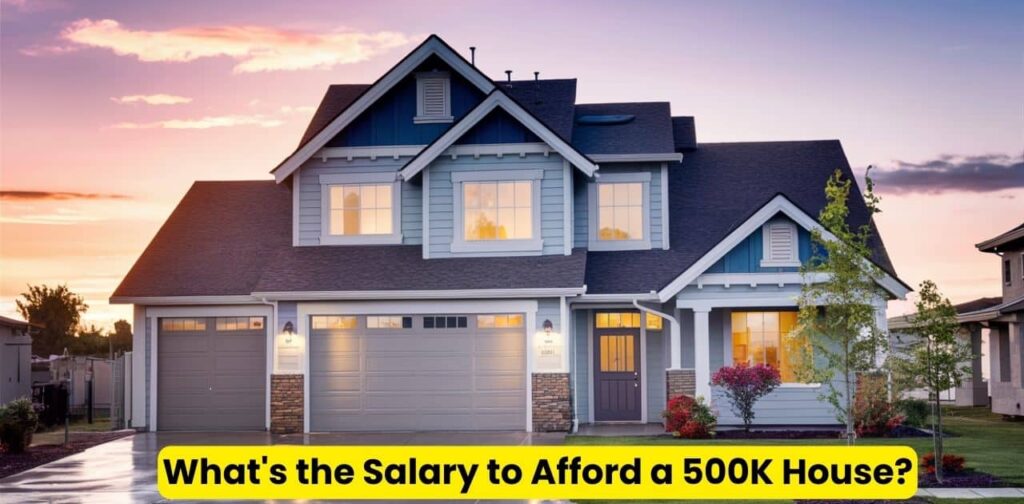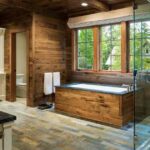Hands up if owning a $500K house sounds like a far-off fantasy. We’ve all been there – drooling over listing pics of swanky homes while wondering how mere mortals can ever afford such real estate gems.
Here’s the reality check: with some smart planning, a $500K price tag doesn’t have to be a total pipe dream. It’s all about understanding the key factors that determine home affordability and exploring creative ways to stretch your budget.
Sure, you’ll need a decent income to swing those heftier mortgage payments. But there are plenty of handy resources and financial assistance programs that can bring your grand designs closer than you think.
In this guide, we’ll break down the salary needed for a $500K mortgage, plus reveal insider tips on everything from budgeting to boosting your buying power. So keep reading as we make that $500K dream a tangible reality!
Key Factors Affecting Home Affordability
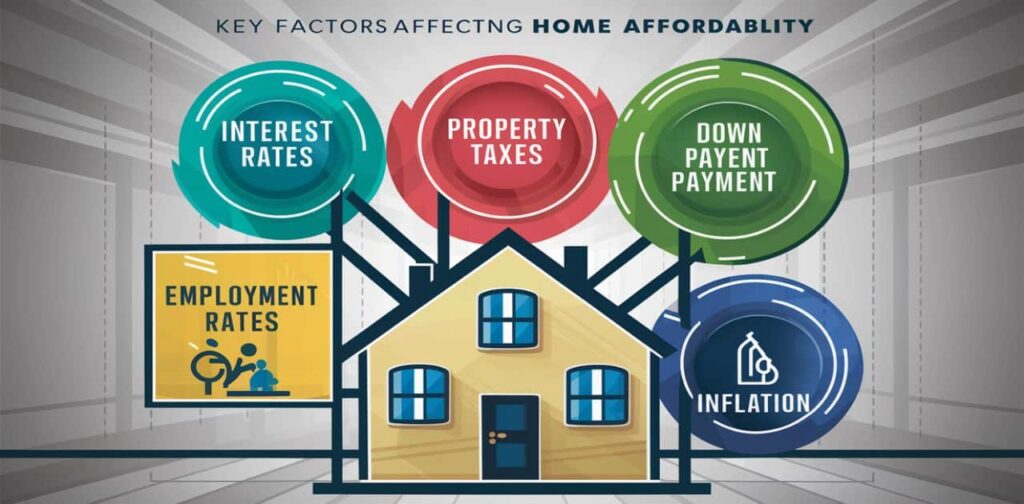
When it comes to shelling out for a $500K home, there’s no one-size-fits-all formula. Your unique financial situation – from your monthly incomings and existing debts to your credit score – plays a huge role in determining what mortgage you can truly afford.
Here’s a quick glance at some of the big-hitters that help lenders gauge your home affordability:
Mortgage Rates and Terms
As of May 2023, the average mortgage rate for a 30-year fixed loan sits around 6.57%. But rates fluctuate all the time based on economic conditions.
A higher interest rate means larger monthly mortgage payments over the loan’s lifetime. So, it pays to keep a close eye on rate movements and lock in when conditions are favorable.
You can offset high rates somewhat by opting for a shorter mortgage term like a 15-year fixed loan. While your monthly payments will be higher, you’ll pay way less interest over the long run a savvy trade-off if your income allows.
Down Payment Impact
Making a larger down payment is one of the best ways to shrink those pesky mortgage bills and avoid costly loan fees.
For conventional mortgages, you typically need to stump up 20% of the home’s value as a down payment. So for our $500K example, we’re looking at $100K right off the bat no small sum.
The good news? You can potentially secure a mortgage with far less than 20% down through FHA, VA or USDA loan programs. Some options require as little as 3.5% down, making a $500K purchase much more achievable for the average buyer.
Monthly Income and Your Debt-to-Income Ratio (DTI)
This ratio is a huge deciding factor for lenders. Essentially, it measures how much of your gross monthly income goes towards paying off debts like:
- Mortgage/rent payments
- Car loans
- Student loans
- Credit card balances
As a general rule, lenders want your DTI to be 36% or less for conventional mortgages. Some government-backed loan programs may allow a slightly higher DTI up to around 50%.
Beyond your DTI, lenders will scrutinize whether you have enough stable monthly income to comfortably cover the new mortgage payment on top of existing debt obligations.
Credit Score Considerations
Your credit score carries some serious weight when applying for financing to purchase an expensive abode.
For conventional mortgages, you’ll generally need excellent credit in the 700+ range to snag the best rates and terms. Those with scores in the 600s may still qualify but will likely face higher interest rates.
Minimum credit score requirements are a bit more lenient for FHA, VA and USDA loans usually in the 600s. But a higher score remains ideal to secure optimal loan pricing and avoid hefty fees.
If your credit is currently lackluster, take some time to boost your score before house hunting. Tactics like disputing errors on your credit report and paying down debts can give your numbers a handy lift.
Property Taxes and Homeowners Insurance
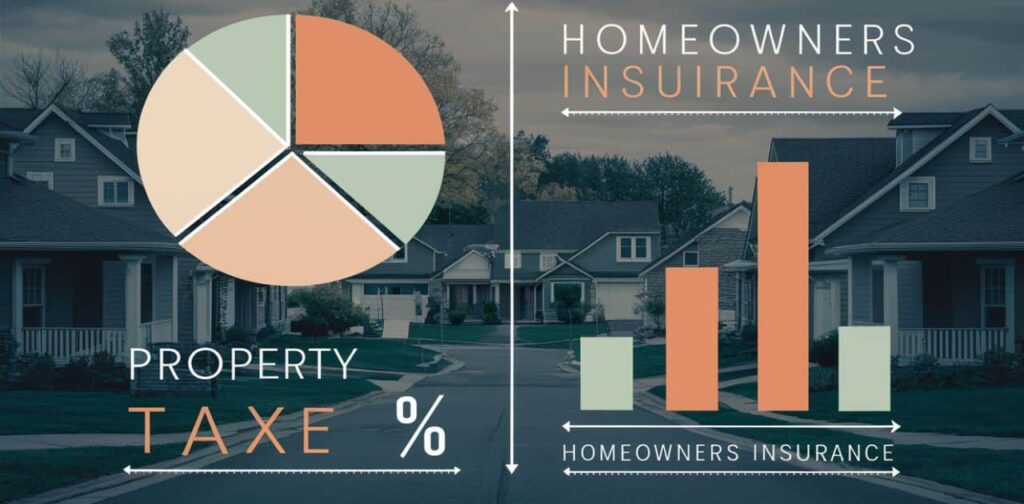
So you’ve got the mortgage side squared away. But owning a $500K property also brings additional carrying costs like:
Property Taxes: Ouch, these can really sting depending on your local tax rates. As a rough guide, property taxes can add $5,000 – $12,500 per year to your housing expenses for a $500K home.
Homeowners Insurance: Averages around $1,200 – $2,000 annually for a house valued at $500K. But rates can spike higher if you live in a disaster-prone area.
Maintenance and Other Expenses: Don’t forget to budget for ongoing maintenance and repairs a necessity for ANY home but especially crucial for higher-end properties.
General advice is to set aside 1-4% of your home’s value each year for wear and tear fixes. For our $500K example, we’re looking at $5,000 – $20,000 annually.
Utility bills, HOA fees (if applicable), renovation costs these extra expenses can quickly add up too. It pays to meticulously account for ALL homeownership costs before taking the $500K plunge.
What Jobs Can Afford a $500K House?
Now to the $500K question burning on everyone’s minds: What salary do I need to afford mortgage payments on such an expensive abode?
The short answer? It’ll take a decent income in the $100K – $200K range for a single earner household to comfortably finance a $500K mortgage. Though the exact number depends on factors like:
- Your down payment amount
- Interest rate on the mortgage
- Remaining debt obligations
- Property taxes and insurance costs in your area
Let’s look at some examples of occupations and salaries that could make $500K mortgages a possibility:
Doctors/Surgeons: With an average salary over $200K, these high-earning medical professionals have major purchasing power for premium properties as long as they keep student loan debts in check.
Software Engineers: A thriving tech career with average pay near $120K sets software developers up nicely for a $500K home, particularly in lower cost-of-living areas.
Corporate Executives (CEO, CFO, etc.): C-suite professionals routinely earn well into the $200K+ range at major corporations, affording luxurious real estate options.
Lawyers: An established law career at a prestigious firm nets salaries of $150K on average, putting million-dollar properties within financial reach.
Dual Income Households: When combining two solid middle-class incomes like a teacher ($60K) and an accountant ($75K), a $500K mortgage is very attainable just add in a decent down payment.
Of course, these are just general estimates. Your specific budget and mortgage eligibility depends on analyzing your exact income, debts, down payment savings and housing costs.
Related Post:
How Much Do I Need To Make To Buy A 300K House?
Income Needed for a $500K Mortgage
Let’s dive deeper into the salary requirements for managing the ongoing costs of owning a $500K property:
Monthly Mortgage Payment Scenarios Assuming you snag a 30-year fixed mortgage for the full $500K amount at today’s 6.57% rate, your estimated mortgage payment (including property taxes and insurance) clocks in around:
- $4,020 per month
- $48,240 per year
To keep housing costs at the recommended 28% of your gross monthly income, your minimum salary should be around:
- $172,860 per year
- $14,405 per month
However, putting down 20% ($100K) reduces your loan amount to $400K. With a lower mortgage of $3,215 per month, the income needed is closer to:
- $137,700 yearly
- $11,475 monthly
Going beyond a 20% down payment yields even lower mortgage payments and income requirements. At a 30% down payment ($150K) on the $500K home:
- $2,875 estimated mortgage payment
- $123,000 minimum yearly income
- $10,250 monthly income
As you can see, the down payment amount dramatically impacts affordability. Even a difference of 10% can potentially save over $30K per year in income needed.
Debt-to-Income Ratio Scenarios
Another major factor determining affordability is your debt-to-income ratio (DTI). Most lenders require a maximum DTI of 36% for conventional mortgages, though some allow up to 50%.
Let’s say your existing monthly debts (car, student loans, etc.) total $1,000. With a $3,215 mortgage payment from putting 20% down on a $500K home, your DTI at various income levels would be:
Annual Income: $100,000
- Monthly Income: $8,333
- DTI with $3,215 Mortgage: ($1,000 + $3,215) / $8,333 = 51% (too high)
Annual Income: $125,000
- Monthly Income: $10,417
- DTI with $3,215 Mortgage: ($1,000 + $3,215) / $10,417 = 41% (acceptable for some lenders)
Annual Income: $150,000
- Monthly Income: $12,500
- DTI with $3,215 Mortgage: ($1,000 + $3,215) / $12,500 = 34% (comfortably meets 36% max)
As illustrated, your existing debts play a major role in what mortgage you qualify for at your income level. The lower your DTI, the higher the mortgage approval odds.
Exploring Down Payment Assistance Programs
Coming up with a 20% down payment worth $100,000 for that $500K property is no easy feat. But don’t ditch your home buying dreams just yet! Numerous down payment assistance (DPA) programs exist to help make that lump sum more manageable:
Grants
The ultimate freebie DPA grants provide funds you DON’T have to pay back, as long as you meet the qualification criteria like being a first-time or low-income buyer. Grants can cover down payments ranging from a few thousand dollars to $25,000+.
Key sources: State and local housing authorities, nonprofits, employers
DPA Loans
Unlike a mortgage, these smaller loans are designed specifically to fund all or part of your down payment. They often come with deferred or forgiven repayment terms after you remain in the home for a set number of years.
Providers: State agencies, nonprofits, Federal Home Loan Banks
Deferred Repayment Loans
Similar to a DPA loan, but you don’t make any payments until years down the road for instance, when you sell, transfer ownership, refinance or reach the loan’s maturity date. This allows time to increase your income before repayment kicks in.
Tax Credits
While not cash upfront, tax credits claimed in the year you purchase can provide thousands back on your tax return. Put this money towards the down payment or closing costs. First-time buyer credits like the proposed $15,000 Biden tax credit are especially lucrative.
Mortgage Rate Buy-Downs
Some housing authorities offer temporary mortgage buy-downs to reduce your interest rate for the first 1-3 years of the loan term. The lower rate yields major savings that can beef up your down payment funds.
Check your eligibility for these and other regional DPA programs. Combining a couple of options may allow you to cover a huge chunk of the down payment for maximum long-term affordability.
Out-of-the-Box Tactics to Afford More $500k Home
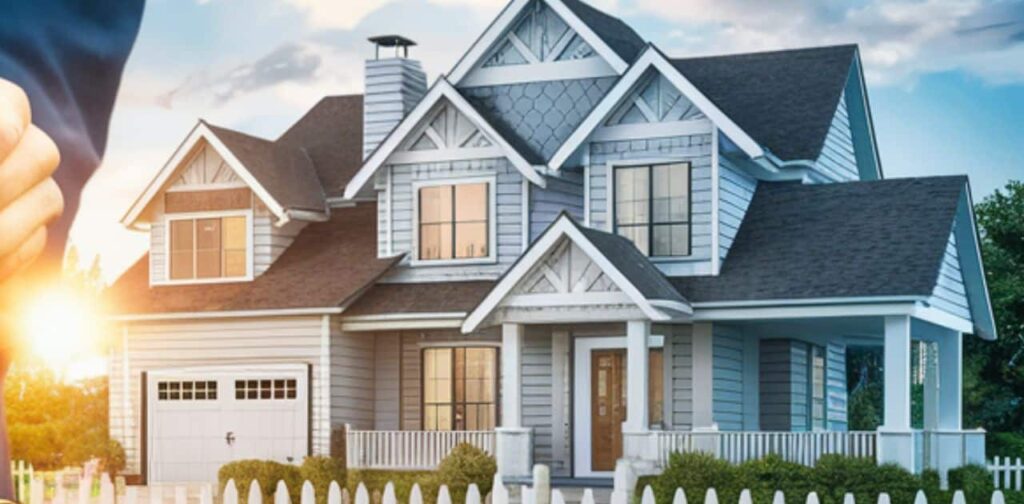
Got a decent income but still struggling with the math on a $500K mortgage? Don’t lose hope! There are plenty of crafty tactics to increase your purchasing power:
Buy With Family or Friends
Combining incomes and resources with a spouse, relative or close friend could be the boost you need to afford pricier digs, like splitting a $1 million home four ways. Just be crystal clear on ownership shares from the get-go.
House Hacking
With this strategy, you purchase a multi-unit home and live in one portion while renting out the other(s) to offset your mortgage. A two-flat could make that $500K budget go way further.
Negotiate Seller Concessions
In a buyer’s market, you may be able to negotiate seller credits towards your closing costs or even your down payment. Every little bit helps achieve your $500K ambitions.
Relocate for Max Affordability
If the median home price in your metro area is hovering near $500K or higher, research more affordable nearby cities and towns. Expanding your search radius could significantly stretch your budget.
Get a Co-Signer
Having a financially stable relative or mentor co-sign your mortgage can allow you to qualify for better rates and higher loan amounts despite limited income or credit issues on your own.
Pick Up a Temporary Side Hustle
Boost your pre-approval income by freelancing, driving for a rideshare service, online tutoring or other temporary money-makers. Even an extra $500 per month could make a major difference.
The bottom line? Where there’s a will (and sufficient income), there’s definitely a way to achieve your $500K real estate dreams through prudent planning and creativity.
FAQs
What’s the Salary to Afford a $500K House?
To keep mortgage payments at the recommended 28% of your gross monthly income, you’ll generally need an annual salary between $137,000 – $173,000 to afford a $500,000 home with a 20% down payment. More is required with a smaller down payment, while less income may work with a larger down payment.
How Much Down Payment for a $500K House for First-Time Buyers?
First-time buyers can potentially purchase a $500,000 home with as little as 3.5% down by using an FHA loan or similar low down payment program. That’s just $17,500 out of pocket versus the $100,000 standard 20% down payment.
What’s the Monthly Payment on a $500K House?
Assuming 20% down on a $500K home and a 6.57% interest rate on a 30-year fixed mortgage, estimated monthly costs are:
- Principal & Interest: $2,534
- Property Taxes: $521 (estimated)
- Homeowners Insurance: $160 (estimated) Total Estimated Payment: $3,215
What Factors Impact if I Can Afford a $500K House?
Key factors determining $500K home affordability include:
- Your monthly income
- Existing debt balances and debt-to-income ratio
- Your credit score
- The mortgage interest rate you qualify for
- How much you can put down
- Housing costs like mortgage, taxes, insurance, maintenance
Are There Any Other Affordability Factors to Consider?
Yes, you’ll also need to budget for:
- Utility costs
- Potential HOA fees
- Ongoing home maintenance/repair costs
- Closing costs when purchasing
- Moving costs
- New furniture/appliances if upsizing considerably
How Can I Afford to Buy a $500K House?
Some tactics to make a $500K property more affordable:
- Increase your down payment through assistance programs
- Buy with a spouse, relative or friend to combine incomes
- Negotiate seller-paid closing costs
- Relocate to a lower cost-of-living area
- Secure a co-signer to qualify for better rates
- Boost your pre-approval income through freelancing/side hustles
How Much Should I Make to Afford a $500,000 House?
Ideally, your annual household income should be in the $137,000 – $173,000 range to comfortably afford $500,000 homes while keeping housing costs around 28% of your monthly gross income. Higher is better, but you may qualify with less depending on your overall finances.
Can I Afford a $500K House on $100K Salary?
A $100K single income could potentially afford a $500K home, but likely requires creative financing:
- Putting at least 20% down to keep mortgage payments reasonable
- Having little-to-no other major debt obligations
- Scoring a lower mortgage interest rate
- Keeping housing costs below 28% of your gross monthly income
- Exploring down payment/closing cost assistance programs
How Much Monthly Payment for a $500K House?
Estimated total monthly payments for a $500K home range from:
- Around $3,215 with 20% down
- Up to $4,020 if putting little to nothing down Actual payments will vary based on your mortgage’s interest rate, down payment, property taxes and homeowners insurance costs.
How Much Do I Need to Save for a $500,000 House?
- Closing costs (2-5% of home price, so $10,000 – $25,000 on a $500K home)
- Moving expenses
- Initial repairs/renovations
- Emergency fund for home maintenance
As a rule of thumb, plan to have at least 25% of the purchase price saved prior to buying that’s $125,000 for a $500K property. More is better to avoid being “house poor” after the down payment and closing costs.
What If I Can’t Quite Afford a $500K Home?
Let’s be real even with creativity and assistance, that $500K price point may still be a stretch for your current financial situation. Rather than overextend yourself, consider these options:
Buy a Less Expensive Home First Start with a more affordable “starter home” in the $250K – $350K range, build equity for several years, then use that for the down payment on your $500K+ dream property.
Continue Renting & Save Aggressively
If home prices are wildly overheated for your area, just keep renting temporarily. Make a game plan to bulk up your down payment reserves through disciplined savings.
Explore Fixer-Upper Options A solid fixer-upper is usually far more budget-friendly per square foot than turnkey properties. Put in some weekend warrior work and you gain instant equity.
Expand Your Home Search Looking in more affordable nearby suburbs or towns instead of pricier city centers can put $500K back in realistic territory. An extra 30-60 minute commute may be worth the upscale abode.
The home buying journey isn’t always linear. Taking incremental steps like these allows you to eventually secure your $500K castle when the timing and financials align.
Final Thoughts
At the end of the day, buying a $500,000 house is a massive financial responsibility requiring stable income, low debt ratios, strong credit and enough in the piggy bank for a meaty down payment.
But don’t ditch those champagne real estate wishes altogether! Thanks to down payment assistance programs, mortgage-savvy strategies and sheer willpower, even six-figure home prices can be within reach for many aspiring owners.
The keys are:
- Getting clarity on income requirements and budget realities
- Exploring every avenue to increase your home purchasing power
- Being patient and keeping your $500K real estate goals front and center
With diligent preparation now, that luxurious $500K dream home can be well within your grasp down the line. Stay focused, motivated house hunters!
Here are some other great resources:
Cost To Build A Barndominium – Real Quote
Power Couple Andre Hakkak And Marissa Shipman Score A Whopping $13.6 Million Mansion In Coral Gables
Thehometrotters .Com Home Decor Ideas

Howdy is behind this home blog, sharing personal stories, thoughts, and insights from daily life. I can dedicated to bringing you the latest trends, expert advice, and creative ideas to make your home the sanctuary you’ve always dreamed of. Whether you’re looking for DIY tips, home decor inspiration, home loans, rentals or renovations.

